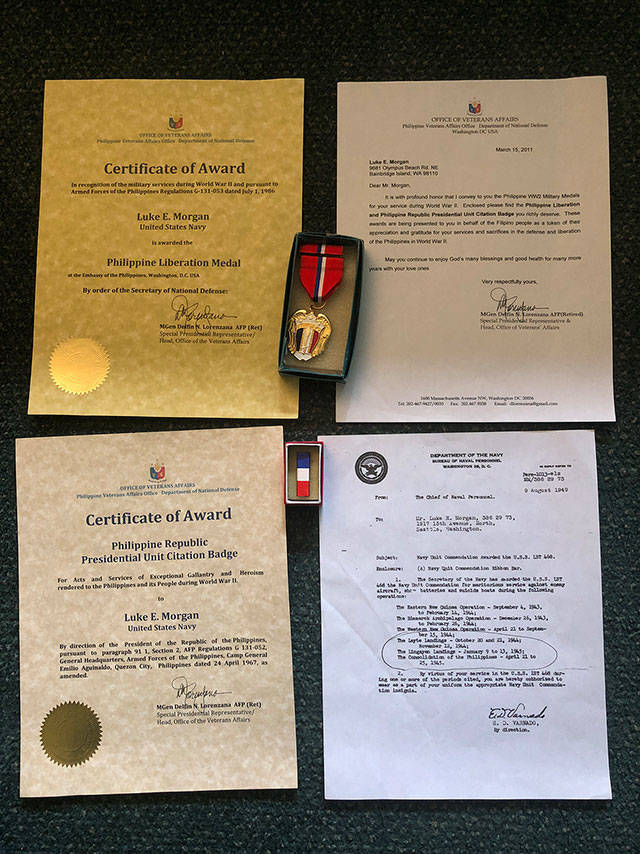As Veterans Day approaches, longtime Bainbridge Island resident and World War II veteran Luke E. Morgan Sr. recently celebrated his 95th birthday, marking another milestone for a man who has experienced everything from The Great Depression to the COVID-19 pandemic.
Morgan was born Nov. 3, 1925, in Seattle, being immediately thrown into the Great Depression.
“It was tough to figure out how you were going to make it,” he said. “People that had a trade seemed to have steady work. People who went on to college graduated… and didn’t have work. So my thought process as a kid growing up was get a trade, and that’s when I went in the Navy. .. Then I discovered the rest of the world, not just Seattle.”
As a teen, Morgan delivered the Seattle Post-Intelligencer at a time when he said it was hard to avoid all the war stories in newspapers.
“We were also losing merchant ships in the Atlantic before the war started,” he said. “There was a lot of opposition to go into Europe again after WWI. It wasn’t until the Japanese made the mistake of attacking Pearl Harbor…”
At 17, Morgan attempted to enlist in the Navy on his birthday but said the line was so long he had to wait three days. He was part of the “minority hitch,” referring to the young men and women who enlisted between the ages of 17-21. It was widely expected that the war would not last more than a year or so, providing many with the opportunity to finish high school with a GED and potentially achieve a college education with some housing assistance.
The fresh-faced kid didn’t have the training for his occupation right off the bat, but a friend was good with the machine shop training while Morgan was a math wizard. Together, they merged their expertise to get through the Naval requirements. He also took diesel ship engine correspondence classes that were suited for the Navy.
Morgan was assigned to a landing craft ship initially to probe the Philippines for Japanese occupation sites. The second phase of the mission was focused on the Leyte (Philippine island) landings in October and November of 1944, where American troops largely occupied the coastal area.
Morgan mostly conducted shore patrol to help out with the jailed Japanese administrators who had held these islands in their control, but also had a one-day leave where he took a vehicle to travel into Manila. The Pacific Ocean theater of WWII was known for its Leyte operations and marked the first time U.S., Philippine and Australian forces were able to push back the Japanese by destroying several significant warships.
“It was strange because there was never any talk of invading Japan, that was all in the central part of the Pacific,” Morgan recalled. “I never saw a real warship. Ours were all amphibious fleets. We knew they were close by, especially destroyers, but they weren’t… right with us.”
Before the war was even over, he said they started to decommission the ship he was on.
“It was after we had the invasion of the Philippines, 3 or 4 days up near Manila. Next thing you know they’re sending everyone home. It was kind of a strange deal,” he said.
After returning to Seattle on a freighter, Morgan had seen more at the age of 20 than most people do in their lifetimes. He avoided having to enter the European theatre, the region where up to 25 million civilians were killed between 1939-1945.
“I knew when I went on the ship that I was going into the Pacific because otherwise I would have been sent to the East Coast. If it had been Europe, that would have been alright with me too – didn’t make a difference. There were so many people that died in that war. I feel uneasy about even mentioning myself because I didn’t get a scratch.”
It had been three years since Morgan had seen his family. He had been writing to the sister of one of his shipmates but had never met her. Bravely, he called her up and asked if she wanted him to stop over in Oakland.
She nonchalantly agreed and Luke followed up, changing his life forever. He ended up marrying that girl, Lillian Fitzgerald, for 70 years and had 10 children together. She passed away in 2017.
“We joked and horsed around a lot between us,” he said. “I can’t remember a fight or an argument. Her dad was Irish and so was my dad. Maybe that kept us from not arguing.”
Morgan used the GI bill to attend Seattle College for law and business school before working for the IRS for 12 years as an investigator, among other occupations.
After hopping around from Portland to Seattle, Morgan finally settled on Bainbridge Island, the place he has called home for nearly 50 years. The cabin he lives in was built in 1926 and has been remodeled many times to maintain its longevity.
Over the years, Morgan has been involved with sponsoring multitudes of Vietnamese refugees and volunteering for Helpline House. He recently celebrated his 95th birthday at home with friends and family, as well as with a large Zoom call with folks who couldn’t be there.



